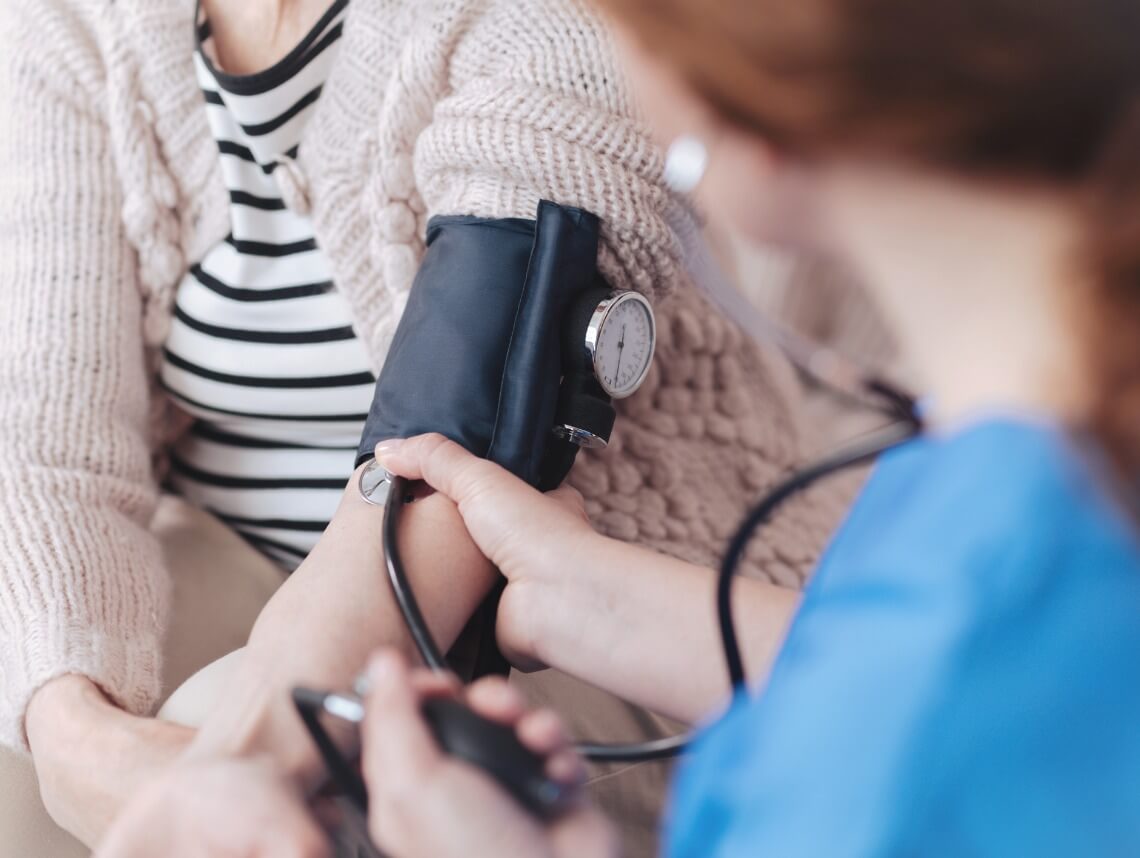
How much do you know about blood pressure?
Here’s a review, in a nutshell: Blood pressure (BP) refers to the pressure of the blood on blood vessel walls as it is pumped through the body. A healthy blood pressure reading is between 90/60 and 120/80. The way to understand these numbers is to know that the top figure (systolic) refers to the pressure against the artery walls during heartbeats, while the bottom number (diastolic) is the pressure of the blood against the artery walls between beats.
High blood pressure (hypertension) is when you consistently have a BP of 140/90 or greater over a number of weeks. You can also have high blood pressure if just one number is higher than normal for a number of weeks.
If you have high blood pressure, this higher pressure puts an extra strain on your heart and blood vessels. Over time, this extra strain increases your risk of a heart attack or stroke.
High blood pressure can also cause heart and kidney disease and is closely linked to some forms of dementia.
Why Is Blood Pressure so Important?
With age, blood pressure is likely to increase. Arteries harden as we age, and plaque can build up, increasing the risk of heart disease or stroke. According to The American Heart Association, an increase of 20 points in a systolic reading and 10 points in a diastolic reading doubles the risk of heart disease or stroke.
8 Ways to Manage and Lower High Blood Pressure
Having high blood pressure can be stressful (which doesn’t help a BP issue). However, several lifestyle changes can help to control it. It’s important to understand that while there are medications that can help to maintain a healthy blood pressure, they shouldn’t be used as a crutch. You must be proactive about improving your BP. Below are five examples of how you can do this:
1. Diet
We’re talking about sustainable lifestyle changes. Something you can see yourself doing for the rest of your life. This is because what you eat affects your blood pressure. Fruit, vegetables, and whole grains are essential elements of a healthy diet. Limit table salt and added sugar.
Check out our article How to Reduce Sugar Intake for Seniors for more information.
2. Manage Stress
When a person is stressed out, the body releases adrenaline and cortisol, which prepare your body for a “fight or flight” response. This causes the heart to beat faster, raising the blood pressure and increasing the risk of a heart attack.
3. Exercise
One way to control blood pressure is to have a strong heart. This would result in pumping more blood with less effort, causing less stress for both the heart muscle and the arteries.
If exercise hasn’t been a steady part of your life, it can be difficult to know where or how to begin. Fortunately, there are many ways to incorporate small changes to transition from a sedentary lifestyle to an active one. You can start by taking a daily walk after meals, dancing around your home to your favorite music, or joining a group in water aerobics (this is an excellent choice for people who have joint issues since the buoyancy relieves stress from the joints).
4. Lose Weight
Losing weight is most effective in decreasing blood pressure among obese and overweight people. This is because the more you weigh, the higher your BP. One way to determine how much weight you need to lose is to measure your Body Mass Index (BMI). To calculate it, take your weight in kilograms (1 pound equals 0.45 kilograms) and divide it by the square of your height in meters (1 inch equals 0.02 meters). Or, use a BMI calculator.
5. Quit Smoking
Besides lung cancer, throat cancer, chronic obstructive pulmonary disease, asthma, heart disease, stroke, cataracts, diabetes, liver cancer, preterm birth, erectile dysfunction, rheumatoid arthritis, gum disease, colorectal cancer, emphysema, chronic bronchitis, smoking also causes high blood pressure. In fact, cigarette smoking causes over two million deaths per year; and many of them can be prevented by not smoking.
6. Limit Alcohol Intake
Alcohol causes blood vessels to constrict. This condition wears off when the alcohol intake stops. Therefore, the more you drink, the longer blood vessels remain in that state, obstructing the blood flow. For an alcoholic, the condition becomes chronic, causing long-term damage to the cardiovascular system.
7. Medication
Medication is only necessary if blood pressure is 160/100 or higher or if there is organ damage, diabetes, coronary artery disease, or kidney disease. Therefore you can’t count on medication as a life-saver. Controlling your BP before it reaches this point will ensure a much higher quality of life.
8. Monitor Your Blood Pressure
You can purchase a blood pressure monitor without a prescription. It will allow you to keep track of your blood pressure right at home. You’ll also have a way to measure how your lifestyle changes affect your blood pressure.
Contact Care Options for Kids for Home Health Care
It can be hard to balance your time between work, home, and family. Homecare providers offer the support you or your loved one needs.
If you or an aging loved one are considering home health care services, contact the caring staff at Care Options for Kids. Call today at (888) 592-5855.
Sources
https://www.heart.org/en/health-topics/high-blood-pressure/understanding-blood-pressure-readings
https://www.heart.org/en/healthy-living/fitness/walking
https://www.sciencedaily.com/releases/2017/06/170623100708.htm
https://www.ncbi.nlm.nih.gov/pmc/articles/PMC3372556/
